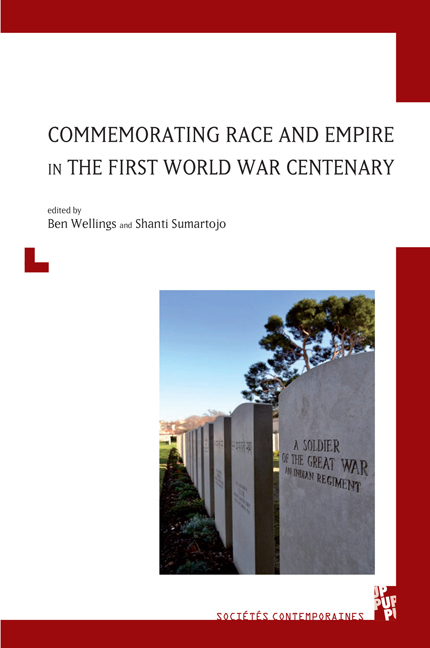Book contents
- Frontmatter
- Contents
- Commemorating Race and Empire in the First World War Centenary
- Rediscovering and Rehabilitating Empire, 2014-2018
- Representing Race and Empire, 1900-1920
- Memorialising Race and Empire in Settler Societies, 1919-2018
- A Tale of Two Monuments: The War Memorials of Oran and Algiers and Commemorative Culture in Colonial and Post-Colonial Algeria
- Anzac, Race and Empire: Memorialising Soldiers and Warriors in Australia
- Contibutor Biographies
- Index terms
A Tale of Two Monuments: The War Memorials of Oran and Algiers and Commemorative Culture in Colonial and Post-Colonial Algeria
from Memorialising Race and Empire in Settler Societies, 1919-2018
- Frontmatter
- Contents
- Commemorating Race and Empire in the First World War Centenary
- Rediscovering and Rehabilitating Empire, 2014-2018
- Representing Race and Empire, 1900-1920
- Memorialising Race and Empire in Settler Societies, 1919-2018
- A Tale of Two Monuments: The War Memorials of Oran and Algiers and Commemorative Culture in Colonial and Post-Colonial Algeria
- Anzac, Race and Empire: Memorialising Soldiers and Warriors in Australia
- Contibutor Biographies
- Index terms
Summary
The Mediterranean separates two worlds in me, one where memories are preserved in measured spaces, the other where the wind and sand erase all trace of men on the open ranges (Albert Camus, The First Man).
With these words, colonial Algeria's most famous war orphan, Albert Camus, encapsulated the struggle of thousands of families across his homeland, both Europeans and indigenous Algerians, who sought to commemorate a loved one lost on the distant battlefields of Europe. For Camus, while France was the land of cypress-lined war cemeteries, his Algerian homeland was marked by memorial anarchy where memory defied official processes of regulation and the forces of nature conspired to undermine aspirations to eternal perpetuation. Behind this lyricism lies a tacit acknowledgement of the very real challenges facing those who seek to elaborate a commemorative discourse in colonial and post-colonial societies where, even more so than in metropolitan societies, rival narratives of past, present and future are constantly struggling for dominance. In this chapter, I will trace the evolution of commemorative culture in colonial and post-colonial Algeria by comparing and contrasting the case studies of the war memorials in the cities of Algiers and Oran. In Sites of Memory, Sites of Mourning, Winter stressed the importance of writing ‘the life histories’ of war memorials, given that they ‘have both shed meanings and taken on new significance’ over the course of their existence. The two monuments considered in this chapter offer what is perhaps one of the best prisms through which to consider the complex, plural and changing nature of colonial memorial discourse, proving once more that while monuments’ sculptural forms may be carved in stone, their symbolic meanings are far from immutable.
French Algeria and the Great War
Before turning to questions of commemoration, we must first consider the impact of the Great War on Algeria's different ethnic communities. Over the course of the war, about 73,000 French citizens from Algeria served in Europe, a proportion roughly equal to that of metropolitan France. In total, some 173,000 indigenous soldiers had served in French forces by the end of war, with slightly more than half of these enlisting as “volunteers”, though this term is questionable given the recruitment practices employed by colonial administra–tors.
- Type
- Chapter
- Information
- Commemorating Race and Empire in the First World War Centenary , pp. 151 - 168Publisher: Liverpool University PressPrint publication year: 2018



